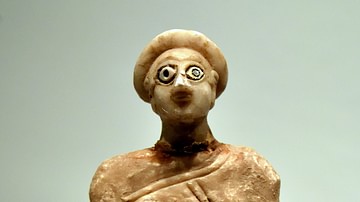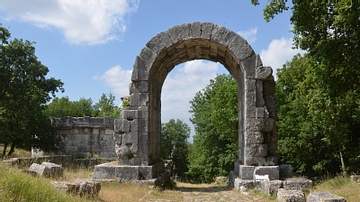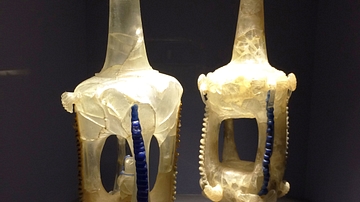Search
Did you mean: Slavs?
Search Results

Definition
Uluburun Shipwreck
The Uluburun shipwreck is a Bronze Age vessel discovered lying off the coast of Kas, Turkey. The ship, probably originally from Phoenicia/Canaan, dates to between 1330 and 1300 BCE and was carrying a full cargo of trade goods, perhaps from...

Article
Trade in Ancient Mesopotamia - How Commerce Encouraged Civilization
Local trade in ancient Mesopotamia began in the Ubaid period (circa 6500-4000 BCE), had developed into long-distance trade by the Uruk period (circa 4000-3100 BCE), and was flourishing by the time of the Early Dynastic period in Mesopotamia...

Article
Trade in the Roman World
Regional, inter-regional and international trade was a common feature of the Roman world. A mix of state control and a free market approach ensured goods produced in one location could be exported far and wide. Cereals, wine and olive oil...

Article
Minoan Jewellery
The jewellery of the Minoan civilization based on Bronze Age Crete demonstrates, as with other Minoan visual art forms, not only a sophisticated technological knowledge (in this case of metalwork) and an ingenuity of design but also a joy...

Article
Celtic Brooches - The Jewellery of the Ancient Celts
Ancient and medieval Celtic cultures produced many forms of jewellery, and one distinctive category is their brooches, fibulae, and pins. Without zips and buttons, brooches were used to close items of clothing, to create a pleasing or fashionable...

Article
Louis IX and Capetian Politics at Paris' Sainte-Chapelle
The Sainte-Chapelle in Paris was originally consecrated as a private royal chapel in 1248 during the reign of King Louis IX of France (r. 1226-1270), who was known in life as rex christianissimus ('most Christian king') and canonized in death...

Article
Lost Treasures From Iraq: Revisited & Identified
For how long do we build a household? For how long do we seal a document? For how long do brothers share the inheritance? For how long is there to be jealousy in the land(?)? The Epic of Gilgamesh, chapter 10, Tablet X. I have always...

Article
Visitor’s Guide to Carsulae (San Damiano)
Carsulae in Umbria, central Italy, was founded c. 300 BCE and only became a prosperous urban centre after it was connected by the Via Flaminia towards the end of the 3rd century BCE. It was granted the status of municipium and acquired a...

Image Gallery
Cups in Antiquity
Cups were a part of everyday life in the ancient world, just as they are today but craftworkers and artists were often challenged to use their talents to produce especially decorative and beautiful examples. In this gallery of 24 images we...

Image
Bottles with Four Tubes from Roman Cologne and Trier
Four tubes are connected to the upper and lower portions of these ancient Roman glass bottles. The tubes were created by carefully cutting and bending the body of a free-blown glass bottle. Like similar piece from Trier, the Cologne bottle...